I think that it’s pretty clear where my reading priorities lie. I love juicy historical fiction, preferably set in England or France, with lots of pages chock full of scheming and treacherous wanna-be royalty. I like books that require me to look at the family tree at the beginning of the novel. I like books that force me to read with my search engine as my companion so that I can check facts. I love books that give me a new castle to visit.
That’s why it was kind of surprising how much I loved The Man Who Couldn’t Eat. At its heart, it is just a simple tale of a man who loves food but is forced to go NPO — nothing by mouth — for three months so that complications from his Crohn’s disease can heal. Jon Reiner’s narrative is truly gripping as he leads the reader through his love of food and the relationships he has established around food. We feel personally the devastation that comes with living a life without going out for breakfast at the local diner, or having Thanksgiving dinner, or even just being able to pick up street food from his neighborhood food truck.
The Man Who Couldn’t Eat is also a lesson in self-discipline; I’m not surprised that there were times he was ready to give up and considered suicide as an alternative to his chronic illness. Reiner’s home life suffered throughout his ordeal; he had been the stay-at-home-dad and the main cook for his family because his wife had to keep her job as a teacher in order to maintain insurance coverage. His young children and his wife are emotional victims of Crohn’s disease along with the physical devastation experienced by Reiner. The Man Who Couldn’t Eat is a vivid look at how much a family’s central core can be damaged by chronic illness. Yet, he lived through the deprivation and emerged to tell his story in a way that will keep the reader fully engaged and unable to stop reading.
JON REINER won the 2010 James Beard Foundation Award for Magazine Feature Writing with Recipes for the collaborative Esquire article “How Men Eat.” His memoir, The Man Who Couldn’t Eat, is based on an acclaimed article of the same name that he wrote for Esquire in 2009. He lives in New York City with his wife and two children (amazon.com).
